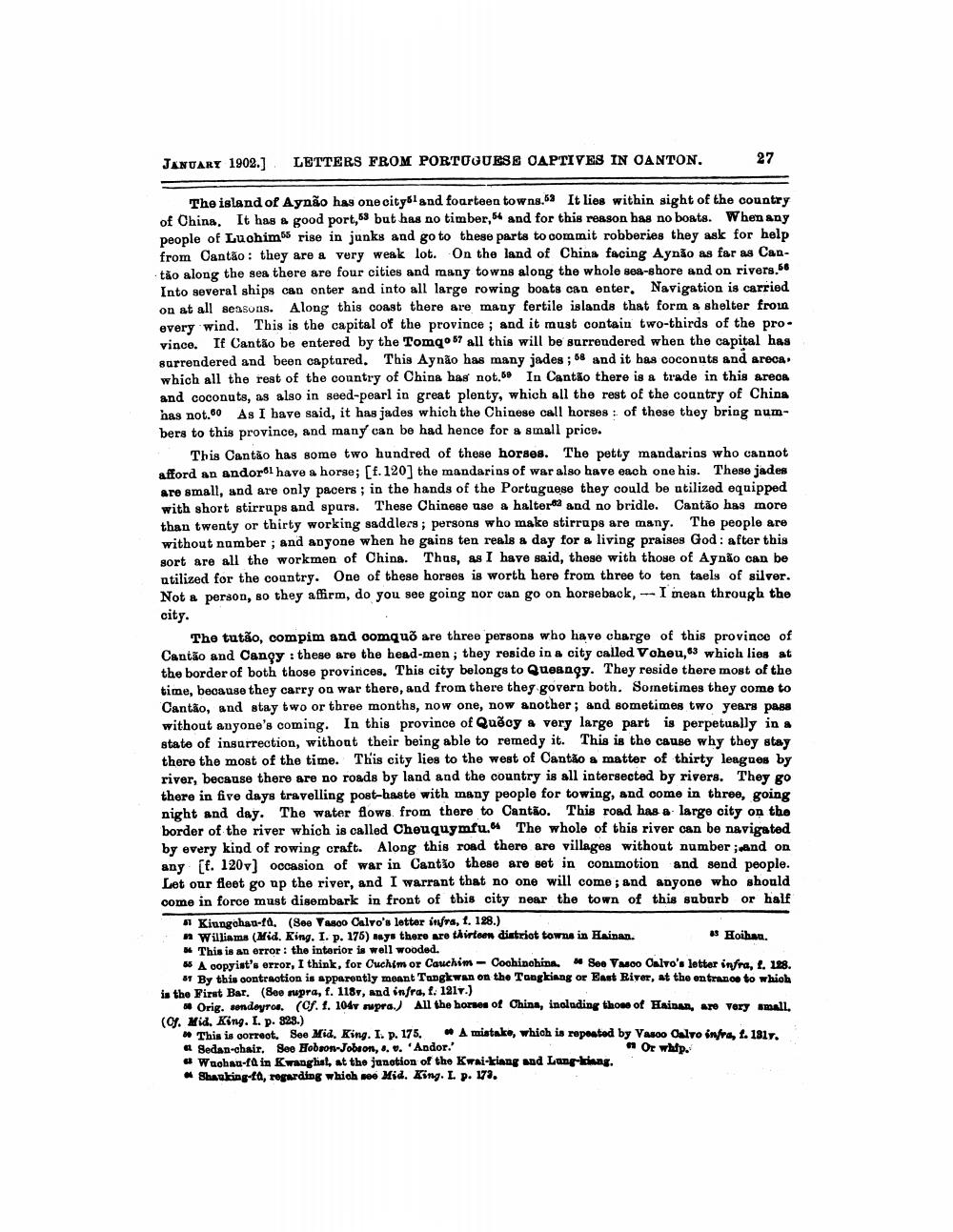________________
JANUARY 1902.)
LETTERS FROM PORTUGUESE CAPTIVES IN OANTON.
27
The island of Aynão has one citysland foarteen towns. It lies within sight of the country of China. It has a good port, 6 but has no timber, 54 and for this reason has no boats. When any people of Luohim rise in janks and go to these parts to commit robberies they ask for help from Cantão : they are a very weak lot. On the land of China facing Aynão as far as Cantão along the sea there are four cities and many towns along the whole sea-shore and on rivers.56 Into several ships can onter and into all large rowing boats can enter, Navigation is carried on at all seasons. Along this coast there are many fertile islands that form a shelter from every wind. This is the capital of the province; and it must contain two-thirds of the pro. vince. If Cantão be entered by the Tomo 57 all this will be surrendered when the capital has surrendered and been captured. This Aynão has many jades; 58 and it has coconuts and areca. which all the rest of the country of China has not. In Cantão there is a trade in this area and coconuts, as also in seed-pearl in great plenty, which all the rest of the country of China has not. As I have said, it has jades which the Chinese call horses : of these they bring numbers to this province, and many can be had hence for a small price.
This Cantão has some two hundred of these horses. The petty mandarins who cannot afford an andorol have a horse; (f. 120] the mandarins of war also have each one his. These jades are small, and are only pacers ; in the hands of the Portuguese they could be utilized equipped with short stirrups and spars. These Chinese use a haltera and no bridlo. Cantão has more than twenty or thirty working saddlers; persons who make stirrups are many. The people are without number; and anyone when he gains ten reals a day for a living praises God: after this sort are all the workmen of China. Thus, as I have said, these with those of Aynão can be utilized for the country. One of these horses is worth here from three to ton taels of silver. Not a person, so they affirm, do you see going nor can go on horseback, - I mean through the
city.
The tutão, compim and compuð are three persons who have charge of this province of Cantão and Cangy : these are the head-men; they reside in a city called Vohou,63 which lies at the border of both those provinces. This city belongs to Queangy. They reside there most of the time, because they carry on war there, and from there they govern both. Sometimes they come to Cantão, and stay two or three months, now one, now another; and sometimes two years pass without anyone's coming. In this province of Quěcy a very large part is perpetually in a state of insurrection, without their being able to remedy it. This is the cause why they stay there the most of the time. This city lies to the west of Cantão a matter of thirty leagues by river, because there are no roads by land and the country is all intersected by rivers. They go there in five days travelling post-haste with many people for towing, and come in three, going night and day. The water flows from there to Cantão. This road has a large city on the border of the river which is called Cheuquymfu. The whole of this river can be navigated by every kind of rowing craft. Along this road there are villages without number and on any (f. 120v] occasion of war in Cantio these are set in commotion and send people. Let our fleet go up the river, and I warrant that no one will come; and anyone who should come in force must disembark in front of this city near the town of this suburb or half
Kiungohad-fa. (899 1800 Calvo's letter infra, f. 128.) n Williams (Mid. King. I. p. 176) says there are thirteen distriot towns in Hainan.
15 Hoihan. # This is an error: the interior is well wooded. - A copyist's error, I think, for Cuchim or Cauchim - Cochinchina.
Of Ouchim or Cauchim - Coohinchina. Seo VM0o Calvo's letter infra, t. 128. * By this contraction is apparently meant Tongkwan on the Tangkiang or East River, at the entrance to which is the First Bar. (800 rupra, f. 118, and infra, f. 121v.)
Orig. sondeyros. (. 1. 104 rupro.) All the horses of China, including those of Hainan, are very small (f. Mid. King. I. p. 829.)
This is oorroot. Soo Mid. King. I. p. 175. A mistake, which is repeated by Vasco Calvo infra, t. 1817. a Sedan-chair. Soe Hobson-Jobson, . . 'Andor.'
Ot whip. Wuohau-l in Kwanghal, at the junction of the Kwai-kiang and Lang-liang. # Shauking-ta, regarding which we Mid. King. I p. 13.




